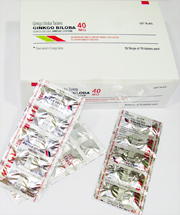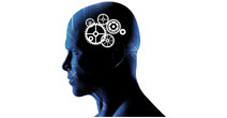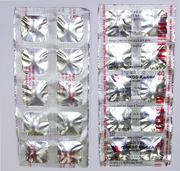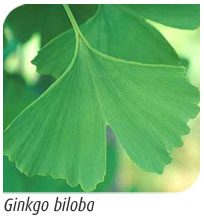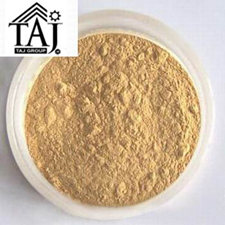


Overview:
Ginkgo (Ginkgo biloba)
is one of the oldest living tree species and its leaves are
among the most extensively studied botanicals in use today. In
Europe and the United States, ginkgo supplements are among the
best-selling herbal medications. It consistently ranks as a
top medicine prescribed in
France and Germany.
Ginkgo has been used in traditional medicine to treat
circulatory disorders and
enhance memory. Scientific studies throughout the years have
found evidence to support these uses. Although not all studies
agree, ginkgo may be especially
effective in treating dementia (including Alzheimer's disease)
and intermittent claudication (poor circulation in the legs).
It also shows promise for enhancing memory in older adults.
Laboratory studies have shown that ginkgo improves blood
circulation by dilating blood vessels and reducing the
stickiness of blood platelets.
Ginkgo leaves contain two types of chemicals (flavonoids and
terpenoids) believed to have potent antioxidant properties.
Antioxidants are substances that scavenge free radicals --
compounds in the body that damage cell membranes, tamper with
DNA, and even cause cell death. Free radicals occur naturally
in the body and grow in number as we age. But environmental
toxins (including ultraviolet light, radiation, cigarette
smoking, and air pollution) can also increase the number of
free radicals. Free radicals are believed to contribute to
health problems including heart disease and cancer as well as
Alzheimer's disease and other forms of dementia. Antioxidants
such as those found in ginkgo can help neutralize free
radicals and may reduce or even help prevent some of the
damage they cause.
Plant Description: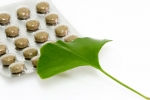
Ginkgo biloba is the oldest living tree species. A single tree
can live as long as 1,000 years and grow to a height of 120
feet. It has short branches with fan-shaped leaves and
inedible fruits that produce a strong odor. The fruit contains
an inner seed, and there has been a report of a human
poisoning from ingesting the seed. Ginkgos are tough, hardy
trees and are sometimes planted along urban streets in the
United States.
Although Chinese herbal medicine has used both the ginkgo leaf
and seed for thousands of years, modern research has focused
on the standardized Ginkgo biloba extract (GBE), which is
prepared from the dried green leaves. This standardized
extract is highly concentrated and seems to be clinically more
effective in treating health problems (particularly
circulatory ailments) than the non-standardized leaf alone.
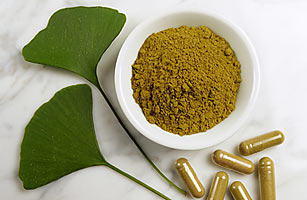
What Is It?
Ginkoba Memory contains the scientifically
tested Ginkgo Biloba leaf extract which historically has been
used in traditional Chinese medicine. Ginkoba Memory's
clinically proven GB3® (Ginkgo Biloba Triple-Standardized)
extract is concentrated 50:1 Ginkgo Biloba leaf standardized
to 24% Ginkgo Flavone glycosides and 6% Terpenes to provide a
consistent level of the active ingredients.
What's It Made Of ? :
More than 40 components isolated from the ginkgo tree have
been identified, but only two are believed to be responsible
for the herb's medicinal effects: flavonoids and terpenoids.
Flavonoids are plant-based antioxidants. Laboratory and animal
studies have shown that flavonoids protect the nerves, heart
muscle, blood vessels, and retina from damage. Terpenoids
(such as ginkgolides) improve blood flow by dilating blood
vessels and reducing the stickiness of platelets.
Medicinal Uses and Indications:
Based on studies conducted in
laboratories, animals, and humans, gingko is used for the
following: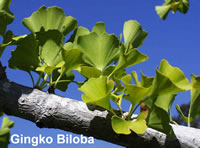
Dementia and
Alzheimer's disease
Ginkgo is widely used in Europe for
treating dementia. It was used originally because it improves
blood flow to the brain. Now further study suggests it may
work directly to protect nerve cells that are damaged in
Alzheimer's disease. A number of studies have found that
gingko has a positive effect on memory and thinking in people
with Alzheimer's or vascular dementia.
Clinical
studies suggest that ginkgo may provide the following benefits
for people with Alzheimer's disease:
Improvement in thinking, learning, and
memory (cognitive function)
Improvement in activities of daily living
Improvement in social behavior
Fewer feelings of depression
Several studies have found that ginkgo may be as effective as
prescription Alzheimer's medications in delaying the symptoms
of dementia.
However, one of the longest and best-designed studies found
ginkgo was no better than placebo in reducing Alzheimer's
symptoms. In a 2008 study, 176 people in the United Kingdom
with Alzheimer's took either ginkgo or placebo for 6 months.
At the end of the study there was no difference in cognitive
function or quality of life between the groups.
Ginkgo is sometimes suggested to prevent Alzheimer's and
dementia, as well, and some studies have suggested it might be
helpful. But in 2008, a well-designed study (the GEM study)
with more than 3,000 elderly participants found the ginkgo was
no better than placebo in preventing dementia or Alzheimer's.
Intermittent Claudication
Because ginkgo
improves blood flow, it has been studied in people with
intermittent claudication (pain caused by reduced blood flow
to the legs). People with intermittent claudication have a
hard time walking without feeling extreme pain. An analysis of
eight published studies revealed that people taking ginkgo
tend to walk roughly 34 meters farther than those taking
placebo. In fact, ginkgo has been shown to be as effective as
a prescription medication in improving pain-free walking
distance. However, regular walking exercises are more
beneficial than ginkgo in improving walking distance.
Glaucoma
One small study found that people with glaucoma who took 120
mg of ginkgo daily for 8 weeks had improvements in their
vision.

Memory Enhancement
Ginkgo is widely touted as a "brain herb." It has been studied
to see whether it can improve memory in people with dementia,
and some studies found it did help. It's less clear whether
ginkgo helps improve memory in healthy people who experience
normal memory loss that comes with age. Some studies have
found slight benefits, while other studies have found no
effect on memory. The most effective dose seems to be greater
than or equal to 240 mg per day. Ginkgo is commonly added to
nutrition bars, soft drinks, and fruit smoothies to boost
memory and enhance cognitive performance, although it's
doubtful that such small amounts of gingko would be effective.
Macular Degeneration
The flavonoids found in ginkgo may help stop or lessen some
retinal problems (problems with the back part of the eye).
Macular degeneration (often called age-related macular
degeneration or ARMD) is an eye disease that affects the
retina. It is a progressive, degenerative eye disease that
tends to affect older adults and is the number one cause of
blindness in the United States. Some studies suggest that
gingko may help preserve vision in those with ARMD.
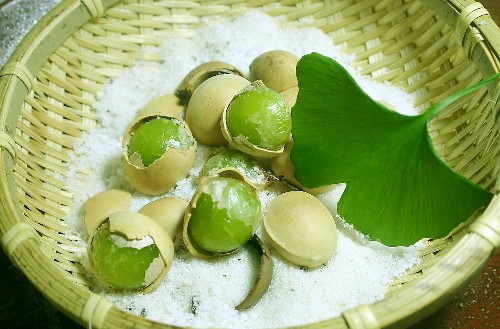
Tinnitus
Nerve damage and certain blood vessel disorders can lead to
tinnitus (ringing, hissing, or other sound in the ears or head
when no external sound is present). Because ginkgo improves
circulation, it has been studied to see whether it can treat
tinnitus. A few poorly designed studies found it might
moderately relieve the loudness of the tinnitus sound.
However, a well-designed study including 1,121 people with
tinnitus found that ginkgo (taken 3 times daily for 3 months)
was no more effective than placebo in relieving symptoms of
tinnitus. In general, tinnitus is a very difficult problem to
treat.
Other
A standardized ginkgo extract was reported to significantly
improve functional measures (such as coordination, energy
level, strength, mental performance, mood, and sensation) in
22 people with multiple sclerosis (MS).
How to
Take It:
Pediatric
Ginkgo is not generally used in children.
Adult
Initial results often take 4 - 6 weeks, but should grow
stronger beyond that period.
Memory impairment and cardiovascular function: Generally, 120
mg daily in divided doses, standardized to contain 24 - 32%
flavone glycosides (flavonoids or heterosides) and 6 - 12%
triterpene lactones (terpenoids). If more serious dementia or
Alzheimer's disease is present, up to 240 mg daily, in 2 or 3
divided doses, may be necessary.
Intermittent claudication: 120 - 240 mg per day
Precautions:
If you are taking a prescription
medicine, such as an anticoagulant agent (a blood thinner),
are pregnant or are nursing, please contact your doctor before
taking Ginkoba Memory. In case of accidental ingestion/
overdosage, seek the advice of a healthcare professional
immediately. Keep this product out of the reach of children.
The use of herbs is a time-honored approach to strengthening
the body and treating disease. Herbs, however, contain
components that can trigger side effects and interact with
other herbs ,
supplements, or medications. For these reasons, herbs should
be taken with care, under the supervision of a health care
provider qualified in the field of botanical medicine. ,
supplements, or medications. For these reasons, herbs should
be taken with care, under the supervision of a health care
provider qualified in the field of botanical medicine.
GBE is generally considered to be safe, and side effects are
rare. In a few cases, gastrointestinal upset, headaches, skin
reactions, and dizziness were reported.
There have been a number of reports of internal bleeding in
people who take ginkgo. However, it is not clear whether
ginkgo was responsible or whether there was another cause
(whether a combination of ginkgo and blood-thinning drugs
caused the bleeding, for example). One human study found that
ginkgo significantly prolonged bleeding time when given along
with cilostazol (Pletal), a commonly used blood-thinner.
However, other studies found that gingko combined with
warfarin (Coumadin) did not prolong bleeding time. Because of
the uncertainty, you should ask your doctor before taking
gingko if you also take blood-thinning drugs.
If you take gingko, you should stop taking it at least 36
hours prior to surgery or dental procedures due to the risk of
bleeding complications. Tell your doctor or dentist that you
take gingko.
People who have epilepsy should not take gingko, because there
is concern that it might cause seizures.
Pregnant and breastfeeding women should
not take gingko.
Do not eat Ginkgo biloba fruit or seed. |










 ,
supplements, or medications. For these reasons, herbs should
be taken with care, under the supervision of a health care
provider qualified in the field of botanical medicine.
,
supplements, or medications. For these reasons, herbs should
be taken with care, under the supervision of a health care
provider qualified in the field of botanical medicine.
